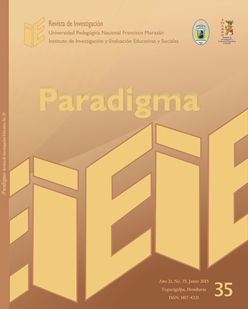Cognitive legitimation of the university’s quality policy through the learning process and academic performance
DOI:
https://doi.org/10.5377/paradigma.v21i35.2278Keywords:
legitimation cognitive, politics of educational quality, learning process, academic performanceAbstract
There is a variety of students’ behaviors related to their learning, but not all lead to an advanced academic performance. However, institutions declare in their policy, quality standards to be fulfill by the involved actors within the educational process. The problem lies in the policy’s construction and how to disseminate and take root in their cognition so that the continuous learning and its results be congruent with the institution’s expectations, since its vision is to position itself in front of the public with a quality image. To have an overview, it was analyzed the theory of the personal construct by Kelly (1969), to expose the hypothesis: that over the years the children and the youngs aground actions; these are related to study habits, however in the majority of the cases not lead to excellence. The action-research method was the stated objective: explain about the learning processes which are used by the university students and consequently about their academic performance. From the obtained results, proceed with the improvement of the learning processes. The sample comprised two groups of college students, these allowed the comparison of the past study trends and post-intervention trends.
Paradigma - Revista de Investigación Educativa. Año 21. No. 35: 75-98
Downloads
1151
Downloads
Published
How to Cite
Issue
Section
License
Transfer of Copyright
- The author, when sending the work, states that it is his will to give the Universidad Pedagógica Nacional Francisco Morazán the patrimonial rights that correspond to him as the author of his work.
- The rights here assigned include all economic rights (Reproduction, transformation, public communication and distribution) and are given without limitation in terms of territory; This Assignment is given for the entire duration term established in the current legislation in Honduras.
- The cession of the aforementioned rights does not imply the cession of moral rights over it, because in accordance with the provisions of the Copyright and Related Rights Law, Chapter II, of the Moral Rights, Article 34, Article 25 , these rights are inalienable, imprescriptible, indefeasible and inalienable.
- The research work or document must be original and have been done without violating or usurping rights of third parties, therefore, the work is exclusively authored and owns the same.
- In the case of any claim or action by a third party, as to copyright on the work in question, the author must assume full responsibility for the rights assigned.
- Upon completion of the Rights Assignment Form, the author states that the work has not been published in another way, that the rights on the work have not been assigned and that no encumbrance or limitation on their use or use is imposed on them.





